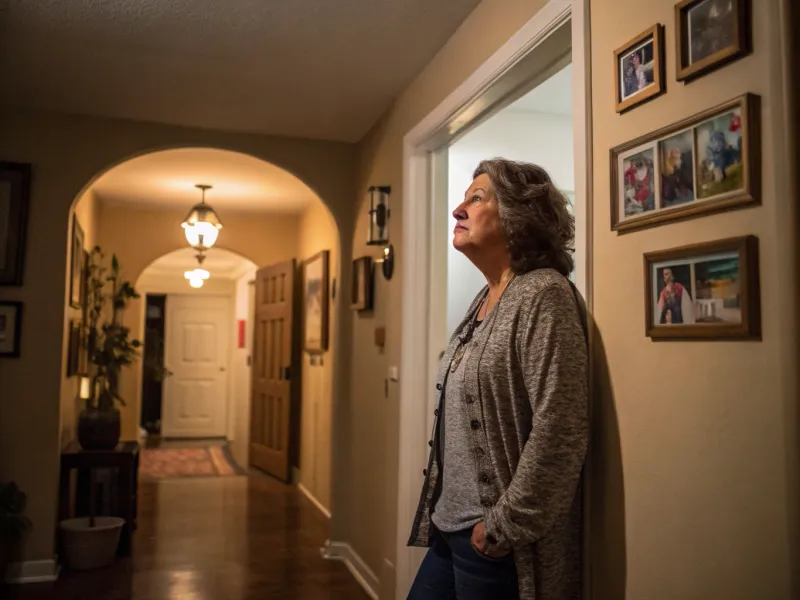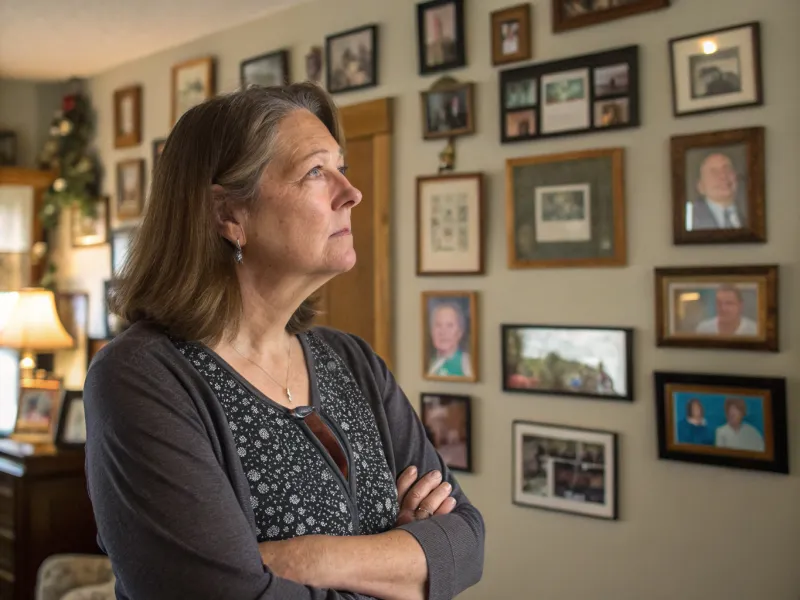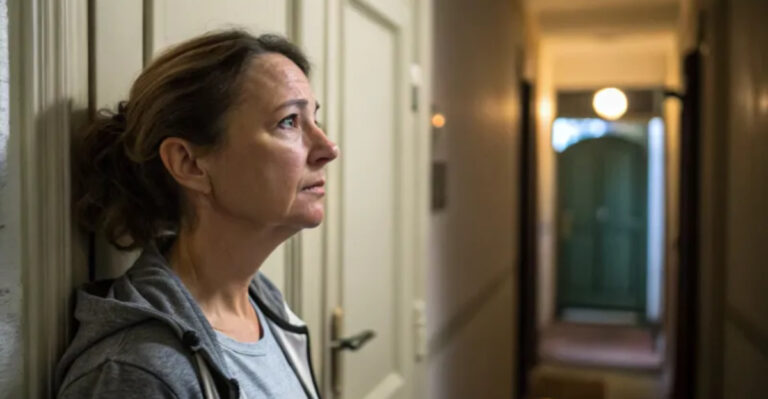36 Powerful Reasons Women Over 50 Decide to End Their Marriage
If you’ve ever found yourself staring at the ceiling at 3 a.m., pondering the complexities of life and love, you’re in good company. We’ve all been there.
You know, when the thought of “till death do us part” feels like a mountain you didn’t exactly sign up to climb. Especially for women over 50, the landscape of marriage can shift dramatically, revealing cracks and crevices you hadn’t noticed before.
In this heartfelt chat, we’re delving into the often unspoken breaking points that lead so many incredible women to reconsider the vows they once cherished. We’re talking real-life insights, a sprinkle of humor, and a whole lot of truth.
So, let’s unravel these stories together. Whether you’re contemplating a major life change or just seeking some validation, there’s something here for everyone.
1. Emotional Distance

You know the feeling when you’re physically in the same room but miles apart emotionally? Emotional distance can creep in like a silent fog, obscuring the warmth and connection that once defined a marriage. For many women over 50, this growing chasm becomes a breaking point.
It’s not about the big fights or dramatic exits; it’s the quiet, lingering silence that speaks volumes. When conversations become functional rather than heartfelt, and the laughter that once filled the house is replaced with the sound of a ticking clock, it’s hard not to feel isolated.
This emotional detachment often stems from years of unresolved issues, unexpressed feelings, and unmet needs. It feels as if you’re living parallel lives under one roof, and yet, the loneliness is palpable. Addressing this gap isn’t easy, and sometimes, choosing to leave is the most loving decision one can make for oneself.
2. Lack of Intimacy

Intimacy, in all its forms, is the glue that holds a relationship together. When that glue begins to wear thin, the bond can weaken, leaving one feeling unwanted and unloved. For women over 50, realizing that intimacy has become a rare guest in their marriage can be a harsh awakening.
It’s not just about physical affection, though that is certainly a part of it. Emotional intimacy, the sharing of dreams, fears, and life’s ups and downs, plays an equally vital role. When intimacy fades, it often signals deeper issues at play, ones that might have been ignored or brushed aside for too long.
Rekindling intimacy requires vulnerability, communication, and sometimes, a lot of hard work. But when efforts to revive this crucial aspect fall flat, it may become clear that moving on is the healthiest option. It’s a tough decision, but sometimes, letting go is an act of self-love.
3. Shifting Priorities

As we grow, so do our priorities. What seemed important at 25 might feel trivial at 55. Many women find that their personal growth leads them on a path divergent from their partners. This shift can become a breaking point when mutual goals and dreams no longer align.
It’s not uncommon for career ambitions, personal passions, or even the desire for more independence to create a rift. Perhaps you’ve discovered a new hobby or a cause that lights you up, but your partner remains unchanged, uninterested, and unengaged.
Navigating these changes requires open dialogue and willingness from both partners to adapt. Yet, sometimes, the differences are irreconcilable. Embracing a new chapter in life might mean leaving behind what no longer serves your evolving self.
4. Unspoken Resentments

Resentment can simmer beneath the surface for years, slowly eroding the foundation of a marriage. Unspoken resentments, once ignored, can manifest in bitterness and discontent, creating a toxic environment that feels impossible to navigate.
These feelings often arise from unmet expectations, perceived slights, or disappointments that have never been addressed. It’s like carrying a backpack full of rocks, each one representing a slight or hurt that gets heavier over time.
When attempts to communicate and resolve these issues fail, the weight becomes unbearable. Deciding to let go of this burden can be freeing, allowing for healing and growth. It’s a courageous step toward reclaiming one’s happiness.
5. Growing Apart

Growing apart might sound cliché, but it’s a reality for many couples. Over time, personal growth can lead partners on different paths, highlighting disparities in interests, values, and visions for the future.
This divergence often happens gradually, almost imperceptibly. One day, you might wake up and realize that the person beside you feels more like a stranger than a soulmate. The shared experiences and commonalities that once bonded you together may no longer exist.
Sometimes, despite efforts to reconnect, the gap continues to widen. Finding common ground becomes a futile exercise, leaving one or both partners feeling unfulfilled. Acknowledging this growing divide can be heartbreaking, yet it might also be the catalyst for a new beginning.
6. Financial Conflicts

Money, often cited as a leading cause of marital strife, can become an insurmountable barrier in a relationship. Financial conflicts may arise from differing spending habits, hidden debts, or contrasting views on money management.
For women over 50, financial security becomes a priority, especially as retirement looms on the horizon. Discovering financial discrepancies or feeling unsupported in financial planning can lead to a significant breaking point.
Addressing these issues requires transparency, trust, and sometimes, professional guidance. However, if financial disagreements persist and threaten one’s sense of security, stepping away might be the most viable solution. Protecting one’s financial future becomes paramount, even if it means ending the relationship.
7. Infidelity

Infidelity cuts deep, like a betrayal of the most sacred vow. For many women, discovering a partner’s unfaithfulness shatters trust, leaving scars that are challenging to heal. It’s a breaking point that often propels one to reevaluate the relationship entirely.
The pain of infidelity goes beyond the act itself; it’s the deceit, the breach of trust, and the emotional turmoil that follows. Rebuilding after such a betrayal requires immense effort and willingness from both parties, and even then, the road to recovery is fraught with challenges.
Choosing to leave after infidelity is an intensely personal decision. It’s about reclaiming dignity, self-respect, and peace of mind. For some, forgiveness is possible, but for others, moving forward means closing this chapter and starting anew.
8. Health Challenges

Health challenges can alter the dynamics of a marriage, often introducing stress and strain that can be overwhelming. For women over 50, navigating personal or a partner’s health issues can become a breaking point, reshaping priorities and perspectives.
Chronic illness or sudden health crises demand patience, empathy, and a shift in roles that may feel burdensome. When one partner is unable or unwilling to provide the necessary support, resentment can build, creating a rift that’s hard to bridge.
Sometimes, these challenges bring couples closer, but other times, they highlight existing fractures, prompting difficult decisions. Choosing to prioritize personal well-being, even if it means ending the relationship, is an act of courage and self-care.
9. Empty Nest Syndrome

The departure of children from home can leave a palpable void, often referred to as the empty nest syndrome. For some women, this transition highlights the absence of shared interests with their partner, leading to a reevaluation of the relationship.
With the noise and chaos of parenting gone, couples are left to face the reality of their partnership. For some, it rekindles romance, while for others, it accentuates the lack of connection that has developed over the years.
If the relationship has revolved primarily around the children, their absence may reveal a partnership that’s grown stagnant. Navigating this new phase requires effort to rediscover each other, but if attempts fail, it might be time to seek fulfillment elsewhere.
10. Loss of Identity

Losing oneself in a marriage is a silent struggle many face, often unnoticed until it becomes overwhelming. The identity that was once vibrant and distinct may become overshadowed by roles of wife, mother, or caregiver.
For women over 50, realizing the extent of this loss can be a wake-up call. The desire to reclaim one’s identity and pursue personal passions may conflict with the dynamics of the marriage, leading to a breaking point.
Embracing this realization involves self-reflection and courage to make tough choices. Sometimes, stepping away from the relationship is necessary to rediscover and nurture the essence of who you truly are.
11. Midlife Crisis

Ah, the infamous midlife crisis—a time of introspection and re-evaluation. For many women, reaching this stage prompts a desire for change and self-discovery, challenging the status quo of their marriage.
This period often involves questioning life choices, seeking new experiences, or even craving a complete transformation. For some, it aligns with their partner’s journey, but for others, it highlights stark differences in life goals and desires.
Navigating a midlife crisis requires understanding, patience, and flexibility from both partners. When these elements are lacking, it may lead to a decision to part ways in pursuit of personal fulfillment and happiness.
12. Incompatibility

Sometimes, it’s simply a case of incompatibility. As individuals grow and evolve, they may find that their partner no longer aligns with their values, beliefs, or lifestyle choices. This realization can be a breaking point for many women over 50.
Incompatibility doesn’t always manifest in conflict; it can be a quiet, underlying tension that affects day-to-day interactions. It’s about recognizing that the partnership no longer feels harmonious or supportive.
Addressing incompatibility involves honest conversations and attempts to find common ground. However, when these efforts fall short, accepting the reality of the situation might lead to the decision to end the marriage and seek a more compatible connection.
13. Lack of Communication

Communication is the backbone of any relationship, yet it’s often the first thing to falter. For women over 50, realizing that conversations with their partner have dwindled to mere exchanges of information can be disheartening.
When communication breaks down, misunderstandings and assumptions can take root, leading to frustration and resentment. It’s a spiral that’s hard to escape from without conscious effort from both partners.
Re-establishing open and honest dialogue requires commitment and patience. When attempts to revive communication fail, it might signal a deeper incompatibility, prompting one to reconsider the future of the marriage.
14. Unfulfilled Dreams

As life progresses, the dreams and aspirations that were once put on hold may resurface with urgency. For many women, the realization that their partner no longer shares or supports these dreams can be a significant breaking point.
Unfulfilled dreams often carry a sense of loss or regret, particularly if sacrifices were made for the relationship. The desire to pursue personal passions or embark on new adventures can create tension if met with indifference or opposition.
Choosing to honor one’s dreams, even if it means stepping away from the marriage, is an empowering decision. It’s about valuing personal growth and happiness, and sometimes, that journey requires leaving the past behind.
15. Erosion of Trust

Trust, once broken, is challenging to rebuild. For women over 50, experiencing a breach of trust—be it through lies, betrayal, or unkept promises—can lead to a pivotal breaking point in a marriage.
The erosion of trust often leads to suspicion, doubt, and emotional distance. It’s a heavy burden to carry, affecting the foundation of the relationship and making it difficult to move forward.
Repairing trust requires time, transparency, and genuine effort from both partners. When these elements are absent, regaining that trust becomes improbable, leading to the decision to move on.
16. Emotional Abuse

Emotional abuse is a silent destroyer, often going unnoticed by those outside the relationship. For women over 50, recognizing patterns of manipulation, control, or degradation can be a profound breaking point.
Unlike physical abuse, emotional abuse chips away at self-esteem and self-worth over time. It can manifest in constant criticism, belittling, or even isolating behavior by the abuser, leaving the victim feeling trapped and powerless.
Acknowledging and confronting emotional abuse is a courageous step toward liberation. Choosing to leave such a toxic environment is an act of reclaiming one’s life and dignity, opening the door to healing and self-discovery.
17. Physical Abuse

Physical abuse is a devastating reality that many women face, often hidden behind closed doors. For women over 50, enduring such violence becomes an undeniable breaking point, demanding immediate action.
The cycle of abuse is complex, often involving periods of calm followed by escalating violence. It’s a pattern that can trap victims in fear and dependency, making it difficult to seek help.
Breaking free from physical abuse requires immense courage and support. It’s a critical step toward safety and empowerment, allowing for a future unburdened by fear. Ending an abusive marriage is not just a choice—it’s a necessity for survival.
18. Addiction Issues

Living with addiction is a relentless struggle, especially when it involves a partner. For women over 50, facing a loved one’s addiction can become an overwhelming breaking point, affecting every aspect of life.
Addiction introduces chaos and unpredictability into a relationship, often accompanied by broken promises and shattered trust. The emotional toll can be immense, leaving one feeling helpless and exhausted.
Seeking help and support is vital, but there comes a time when prioritizing one’s own well-being becomes paramount. Choosing to leave an environment dominated by addiction is a step toward reclaiming peace and stability.
19. Cultural or Religious Differences

Cultural and religious differences can enrich a relationship, but they can also lead to misunderstandings and conflict. For women over 50, these differences might become more pronounced, affecting harmony in the marriage.
When beliefs and practices clash, it can be challenging to find common ground. Compromise might seem impossible, leading to feelings of resentment or a sense of losing one’s identity.
Acknowledging these differences and their impact on the relationship is crucial. If they become insurmountable, choosing to part ways may be necessary to honor one’s beliefs and seek a more compatible partnership.
20. Parental Responsibilities

Balancing parental responsibilities, particularly caring for aging parents, can strain a marriage. For women over 50, these duties often fall disproportionately on their shoulders, leading to stress and resentment.
The demands of caregiving can consume time and energy, leaving little for personal needs or the relationship. If a partner is unsupportive or absent, it can exacerbate feelings of isolation and burnout.
Addressing this imbalance requires open communication and shared responsibility. However, if the burden remains unshared and overwhelming, it might prompt a reevaluation of the marriage’s sustainability.
21. Increased Life Expectancy

With increased life expectancy comes the realization that there are many years ahead to live, potentially in a dissatisfying marriage.
Women over 50 may contemplate whether they want to spend another several decades in a relationship that no longer fulfills them. The idea of living a full life, perhaps even a second act, can be a powerful motivation to leave an unfulfilling marriage.
This decision often involves weighing the comfort of familiarity against the potential for a richer, more rewarding life.
22. Dependency Issues

Dependency, whether emotional or financial, can create an imbalance in a relationship. For women over 50, dealing with a partner’s over-reliance may become a burden that leads to a breaking point.
This imbalance often results in feelings of being trapped or responsible for the partner’s well-being, overshadowing one’s own needs and aspirations. The weight of this dependency can stifle personal growth and breed resentment.
Addressing dependency requires setting boundaries and fostering independence. If these efforts fail and the imbalance persists, it might be necessary to step away to regain autonomy and pursue a balanced life.
23. Life Transitions

Life transitions, such as retirement or relocation, can significantly impact a relationship. For women over 50, these changes may highlight differences in vision for the future, leading to a breaking point.
Transitions often require adaptability and mutual support, but they can also introduce stress and uncertainty. If a partner is resistant to change or unsupportive of new directions, it can create tension and dissatisfaction.
Navigating these transitions successfully involves collaboration and compromise. However, when these elements are absent, choosing to move on might be the best way to embrace new opportunities and personal growth.
24. Fading Romance

Romance, the spark that once ignited passion, can fade over time, leaving a relationship feeling stale and uninspired. For women over 50, the absence of romance can be a significant breaking point, prompting reflection on the partnership’s vitality.
Rekindling romance requires effort, creativity, and a willingness to prioritize the relationship. However, if attempts to revive the spark prove unsuccessful, it may signal that the connection has run its course.
Choosing to leave in search of new adventures and passion is a courageous step toward rediscovering joy and excitement in life.
25. Generational Differences

Generational differences can lead to misunderstandings and disconnects in a relationship. For women over 50, these differences might become more pronounced, affecting communication and mutual understanding.
Different values, perspectives, and approaches to life can create friction, leading to feelings of being misunderstood or unappreciated. It’s a challenge that requires empathy and adaptability from both partners.
When efforts to bridge these gaps fail, it might signal a deeper incompatibility. Choosing to part ways can open the door to relationships that resonate more closely with one’s own values and experiences.
26. Chronic Negativity

Living with chronic negativity can be draining, casting a shadow over daily life and interactions. For women over 50, enduring a partner’s persistent pessimism may become a breaking point, affecting mental health and happiness.
Negativity often manifests as criticism, complaining, or a defeatist attitude, creating an atmosphere of tension and dissatisfaction. It’s a cycle that’s hard to break without significant change in attitude and behavior.
Choosing to remove oneself from such a toxic environment is a step toward reclaiming positivity and joy. It’s about prioritizing one’s well-being and seeking an uplifting and supportive relationship.
27. Lack of Appreciation

Feeling unappreciated can erode self-worth and satisfaction in a relationship. For women over 50, realizing that their efforts and sacrifices go unnoticed may become a breaking point.
Appreciation is a fundamental component of a healthy relationship, involving recognition and gratitude for each other’s contributions. Its absence can lead to resentment and emotional distance.
When efforts to express and receive appreciation fall short, it may prompt a decision to seek a relationship where one’s value is acknowledged and cherished.
28. Pursuit of Happiness

The pursuit of happiness is a personal journey, one that may lead to reevaluation of a marriage. For women over 50, this pursuit often involves seeking fulfillment and joy that might be missing from the relationship.
It’s about recognizing that life is too short to settle for anything less than happiness and contentment. This realization can be a powerful motivator for change.
Choosing to prioritize personal happiness, even if it means ending the marriage, is a courageous step toward a fulfilling future. It’s about embracing the possibility of a life filled with joy and purpose.
29. Desire for Personal Growth

For some women, reaching the age of 50 sparks a desire for personal growth and self-improvement that their marriages no longer support.
This newfound quest for personal development can create a rift if the spouse is unsupportive or dismissive of these aspirations.
The desire to pursue education, new hobbies, or career changes can lead to a reassessment of the marital relationship. When a spouse feels stifled in their growth, it might be time to consider whether the marriage aligns with their new path in life.
30. Need for Independence

After decades of shared life experiences, some women desire a newfound independence. This need can stem from years of prioritizing others’ needs over their own, leading to a strong urge to reclaim personal space and autonomy.
The realization that life is finite can prompt a desire to live independently and explore individual potential.
For those who feel constrained by their marriage, seeking independence can be a liberating decision, even if it means ending the marital relationship.
31. Realizing You’ve Outgrown the Relationship

Growth is beautiful, but sometimes it means outgrowing the very things you once held close—including your marriage. For many women over 50, there’s a moment when you look at the life you’ve built and realize it no longer fits who you are today.
It’s not about blame or failure—it’s about evolution. You’ve changed, your needs have shifted, and that’s not just okay—it’s natural. Staying in a relationship that no longer aligns with your truth can feel like wearing a dress that used to be perfect but now feels too tight in all the wrong places.
Outgrowing a marriage doesn’t mean you’ve given up—it means you’re making space for the life and love you now deserve. It’s a quiet revolution, and yes, you’re allowed to choose you.
32. Wanting Peace More Than Partnership

Sometimes, the loudest reason for leaving is the quietest: you simply want peace. Not passion, not promises—just a sense of deep, soul-soothing peace. And when your marriage has become a source of tension, drama, or emotional labor, that craving becomes impossible to ignore.
For women over 50, peace often becomes more valuable than partnership for its own sake. You’ve learned that being alone doesn’t mean being lonely—it can mean being free, calm, and finally yourself.
So if your heart is whispering that peace is the next chapter, listen closely. Because there is no greater love than the one you give yourself by choosing a life that feels light, free, and beautifully yours.
33. Embracing a New Career Path

Sometimes, a new career can be a catalyst for change. For some women over 50, discovering a passion for a profession that excites them can lead to reevaluating their personal life. The newfound enthusiasm and independence that come with pursuing a new career path often bring clarity about what is truly important.
This revelation may highlight the lack of support or understanding from their partner, pushing them to choose independence over a stagnant relationship.
Ultimately, the desire to align their professional and personal lives can be a powerful motivator to seek separation.
34. Seeking Adventure and Travel

Adventure often beckons to those who have spent years prioritizing others. For women over 50, the longing to explore the world and experience new cultures can become irresistible. Traveling solo or with friends allows them to rediscover themselves in exciting, unfamiliar settings.
This desire for exploration can reveal a partner’s reluctance to embrace change or leave comfort zones.
The realization that life is too short to stay in one place may inspire them to conclude that a relationship no longer fulfills their adventurous spirit.
35. Desire for Creative Fulfillment

Some women discover a passion for painting they never knew existed. As their artistic skills flourish, they begin to crave the creative freedom that marriage sometimes seems to stifle. The studio becomes a sanctuary—each brushstroke expressing truths they had long kept inside.
This newfound love for art can give them the courage to reshape their lives and seek spaces where their creativity can thrive without limits.
In a world of color and canvas, women over 50 find a voice that had been quieted for too long. The joy of creating becomes essential to their identity, eventually leading to the realization that personal fulfillment is worth pursuing on their own terms. Choosing a life centered around art becomes a powerful step toward self-discovery and autonomy.
36. Rediscovery of Cultural Roots

After years some women feel an undeniable pull back to their roots. At 50, the aroma of spices and the sounds of traditional music can stir something deep in the soul. For them, reconnecting with their culture becomes a key part of rediscovering who they are.
The vibrant markets, the language of childhood, and the warmth of heritage bring a sense of belonging that may have long been missing. These experiences can ignite a deep-seated desire to fully immerse in their ancestry, often leading to the decision to part ways with a previous life.
This kind of journey isn’t just about leaving a relationship—it’s about embracing the rich tapestry of one’s past. A cultural homecoming like this offers a renewed sense of identity and purpose.







